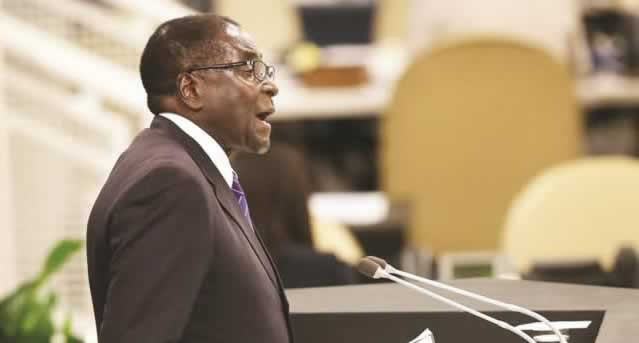‘Let’s stop exporting primary products’

Cletus Mushanawani in KUWAITI CITY, Kuwait
PRESIDENT Mugabe has called on African and Arab countries to resist the continuous export of primary products and raw materials to feed the industrial needs of the West and instead concentrate on increasing trade and investment among themselves.
Addressing the Third Arab-African Summit here yesterday, President Mugabe said: “The unbalanced North/South cooperation, an extension of the colonial system, has demonstrated repeated failures, especially for developing countries, which only got ‘developed’ on the prescription and dictates of the West.
“The economic pattern, which our regions should resist, has been the continuous export of primary products and raw materials to feed the industrial needs of the West. It is my fervent hope that the Africa-Arab partnership can and should be utilised as an instrument to enhance trade and investment to the levels that reflect the strong cultural ties, our geographic proximity and the tremendous potential that exists within and between our two regions. That way, we will also be economically empowering our people,” President Mugabe said.
President Mugabe, who earlier on had a closed door meeting with Independent Petroleum Group representatives that was attended by Finance Minister Patrick Chinamasa and Foreign Affairs Minister Simbarashe Mumbengegwi, urged Arab investors to seize available investment opportunities in Africa.
“The harnessing of African resources with funding and expertise from the Arab world provides an environment for jointly implemented organic development with the capacity to engender sustainable development,” he said.
“African and Arab countries should now strive to lure larger investment capital inflows in the agricultural sector, where Africa’s potential is high. Investment in agriculture will address challenges related to food security and provide raw materials for agro-industries.
“Countries from both regions should ensure abundant harvests to address food insecurity. It is important to us to seize available opportunities to venture into cooperative strategies that will develop agricultural infrastructure to ensure that agriculture is pivotal in eliminating poverty.”
President Mugabe said the near dearth of foreign direct investment, poor infrastructure, unreliable access to energy supplies and high import tariffs remained significant barriers to trade and investment.
“In Southern Africa, Sadc is continually striving to ensure regional integration and connectivity in order to remove barriers to an inclusive regional market,” he said.
“The challenges the region faces can be better resolved through breaking trade and investment barriers between our two regions in order to strengthen fair trade and investment, which are key components to sustainable development.”
President Mugabe said there were diverse investment opportunities in Zimbabwe in the agriculture, energy, manufacturing, information communication technology, tourism and mining sectors.
“Arab investors will find several positive investment indicators in Zimbabwe such as the availability of highly skilled, literate and hardworking people, the country’s strategic location, availability of natural resources, a diversified economy and political stability,” he said.
“Over its 33 years of independence, Zimbabwe has benefited from Arab development financial institutions, namely, the Bank for Economic Development in Africa (Badea), Kuwait Fund for Arab Economic Development (KFAED), the Organisation of Petroleum Exporting Countries (Opec) and Fund for International Development (OFID).
“This assistance has, indeed, improved our infrastructure, enhanced capacity building and agricultural production. Following the new mandate given to my Government by the people of Zimbabwe during the 31 July harmonised elections, we stand ready to continue cooperating with the Arab world.
“My Government has prioritised the implementation of pro-poor economic development initiatives hinged on the consolidation of economic stability, revival of key sectors such as agriculture, mining, tourism and manufacturing.
“It is also imperative that our Africa-Arab cooperation should resist the neo-colonialist and imperialist machinations and Western hegemonic evil strategies to interfere in our sovereign countries in order to bring about regime change. Zimbabwe has for a long period suffered from the weight of illegal sanctions and asks for your support to have them lifted forthwith.”
Officially opening the two-day summit, Amir of the State of Kuwait, Sheikh Khaled Al-Ahmed Al-Jaber Al-Sabah, said his country had recognised the strategic importance of the Arab-African group and he had directed that the Kuwait Fund For Economic Development should offer soft loans to African countries amounting to US$1 billion during the next five years.
“We recognise the importance to exert all possible efforts to make the African continent a main component within the system of the promising economies of the world. We realise also that this cannot occur, except through an investment-friendly environment that facilities the flow of foreign investments to the African states,” he said.
Sheik Al-Sabah said attaining of integration between Arab and African countries could not be realised without stability in the region.
“The stability we seek in this region cannot be achieved while Israel continues its intransigence and refusal to implement the resolutions of the international legitimacy and its insistence on expanding the building of settlements,” he said.
“We call upon the international community and in particular the (United Nations) Security Council to put pressure on Israel, in order to induce it to implement the resolutions of international legitimacy, to establish an independent viable Palestinian State in accordance with international resolutions and the Arab Peace Initiative.”










Comments